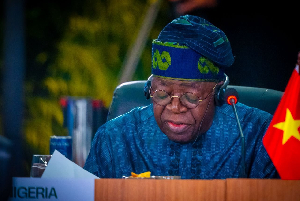President Bola Tinubu yesterday disclosed that there will soon be a greater visibility of made in Nigeria products in public procurement and key sectors.
He cited examples of uniforms, hospital supplies, cables, meters, packaging and pharmaceuticals.
He also told citizens to expect better value and safety through standard enforcement and product authentication.
Tinubu spoke in Lagos while delivering the keynote address at 53rd Annual General Meeting (AGM) of the Manufacturers Association of Nigeria (MAN).
The AGM was themed, “Nigeria First: Prioritising Made-in-Nigeria.”
Represented by Minister of State for Industry, Trade and Investment, Senator John Owan Enoh, Tinubu said “By December 2025, the federal ministry of industry, trade and investment and BPP will issue guidelines on documentation required when imports are chosen over certified local options.
The President said Nigeria first policy is not a slogan, but “a disciplined way to spend, to procure, and to compete.” He insisted that the government will prefer Nigerian products that meet standards.
Delivering keynote address, foremost African industrialist and President of Dangote Group, Aliko Dangote, called for a deliberate shift toward local industrial development and expansion ensuring that Nigerian products, talent, and industries take priority in national procurement and trade decisions.
The Nigeria’s first policy, he said, if implemented effectively, would boost GDP, reduce import dependence, and generate jobs.
Dangote who was represented by Engr Mansur Ahmed said, “Once a vibrant sector employing over 500,000 people across underscores the urgent need for policies that prioritise domestic 180 mills, the textile industry has suffered from a combination of factors including unchecked importation of finished textiles, outdated machinery, inconsistent government support…” he said.
On his part, MAN President, Francis Meshioye, asked government to back Nigeria First policy with legislation, enforce it across all MDAs, and tie compliance to performance metrics monitored by the National Bureau of Procurement.
He also demanded that government set annual local content benchmarks for government procurement in key sectors such as automobiles, textiles, pharmaceuticals, and agro-processing.
He added that the government should penalise non-compliance and reward MDAs that exceed their local content procurement targets.
“Executive Orders 003 and 005 were ineffective due to the absence of consequencies for non-compliance,” he said.
Business News of Friday, 17 October 2025
Source: www.dailytrust.com













